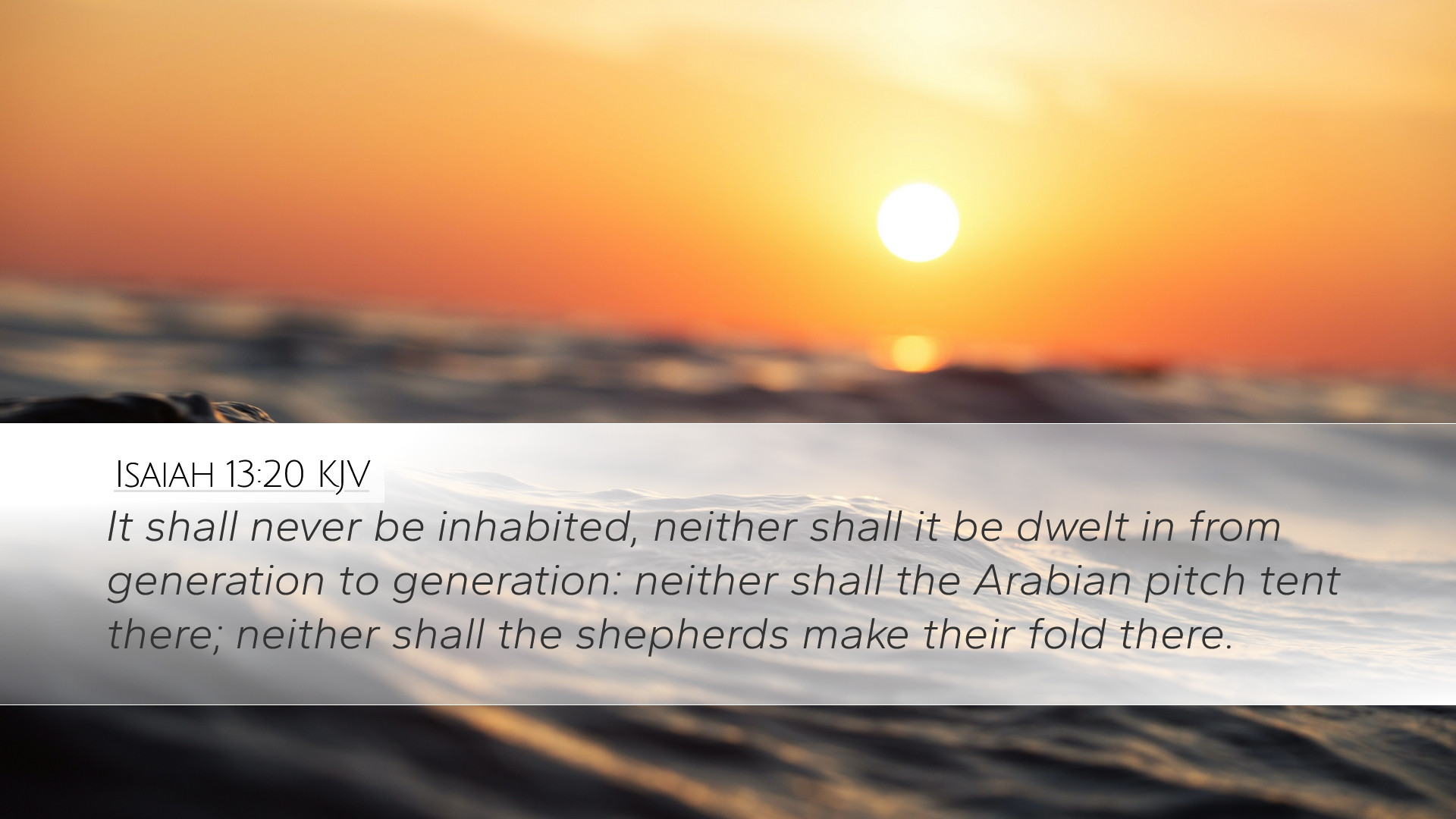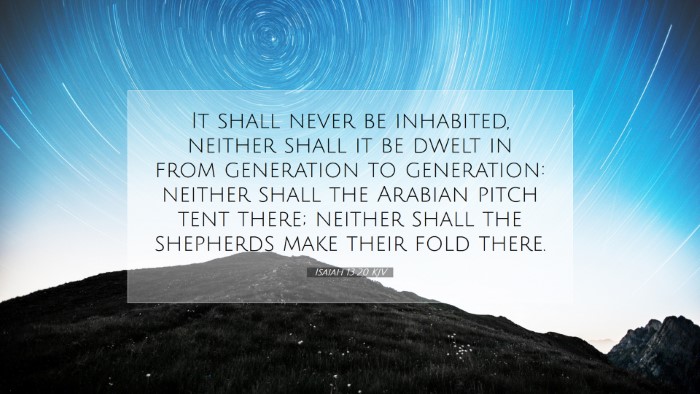Commentary on Isaiah 13:20
Text of Isaiah 13:20: "It shall never be inhabited, neither shall it be dwelt in from generation to generation: neither shall the Arabian pitch tent there; neither shall the shepherds make their fold there."
Introduction
This verse is part of the prophetic declaration concerning the fall of Babylon, as recorded in the book of Isaiah. It provides insight not only into the fate of a historical city but also into the broader themes of divine judgment, desolation, and the sovereignty of God. The commentaries of Matthew Henry, Albert Barnes, and Adam Clarke reveal profound layers of meaning in this verse, offering valuable perspectives for pastors, students, theologians, and scholars.
Historical Context
Isaiah prophesied during a tumultuous time in Israel's history, primarily addressing the impending judgments upon Babylon. As a prominent center of power, Babylon was known for its grandeur and luxury. However, Isaiah foretold its ultimate destruction and desolation, emphasizing God's control over the nations of the earth.
Divine Judgment
As indicated in this verse, God’s judgment results in complete desolation. Matthew Henry notes the seriousness of divine judgment whereby a once-thriving city, emblematic of human pride and opposition to God, is reduced to a wasteland.
- Inhabited No More: The phrase "It shall never be inhabited" underscores a total and irreversible desolation. God removes His presence from those who oppose Him.
- Generational Desolation: "Neither shall it be dwelt in from generation to generation" reflects the permanence of this judgment. There is a divine decree against any semblance of restoration.
- Desertion by Pastoral Figures: The mention of "Arabian pitch tent" and "shepherds" highlights that even those who typically settle and cultivate lands recognize that it is futile to dwell in a place of God’s curse.
Albert Barnes remarks that God's judgments serve as a warning to all nations. The desolation reflects God's power over empires that rise against Him, serving as a poignant reminder of His ultimate authority.
Theological Insights
This verse not only signifies the judgment on Babylon but also reflects theological truths about God's relationship with humanity and His sovereignty over history.
- Sovereignty of God: Clarke emphasizes that this prophecy showcases God’s control over nations and their destinies. Human efforts to establish lasting legacy apart from God are ultimately futile.
- Sin and Consequences: The destruction of Babylon symbolizes the broader biblical narrative about sin leading to desolation, forming a cornerstone for understanding the nature of sin in Scripture.
- Hope Amidst Judgment: While God's judgment is harsh, it is also redemptive. Henry articulates that such prophecies remind believers of the consequences that come from turning away from God, while also offering hope that God remains a refuge for those who trust in Him.
Lessons for Today
This prophecy has significant implications for contemporary readers, especially for those in pastoral ministry, education, and scholarship. It serves as a call to recognize the following:
- Awareness of God’s Sovereign Control: Believers are encouraged to remember that God holds authority over all earthly powers. Understanding history in light of God's sovereignty fosters humility in ministry and scholarship.
- The Seriousness of Sin: This verse captures the dire consequences of sin. Pastors and theologians should preach the seriousness of turning from God and the importance of repentance.
- Hope for Restoration: Just as prophecy can indicate destruction, it also points toward eventual restoration for those who return to God. This brings great comfort and encouragement to believers today.
Conclusion
Isaiah 13:20 encapsulates a profound warning about the consequences of human pride against divine authority. By examining this verse through the lenses provided by public domain commentaries, we gain a richer understanding of both the nature of God’s judgment and the hope we find in His redemptive plans. Engaging with historical contexts and spiritual truths allows believers to apply these lessons in meaningful ways today, cultivating a deeper relationship with God and a greater understanding of His ways.


